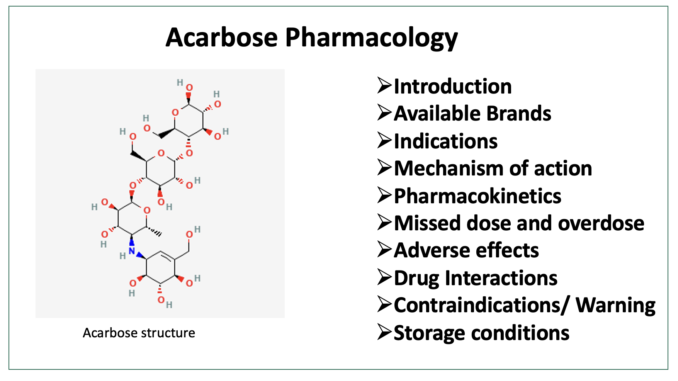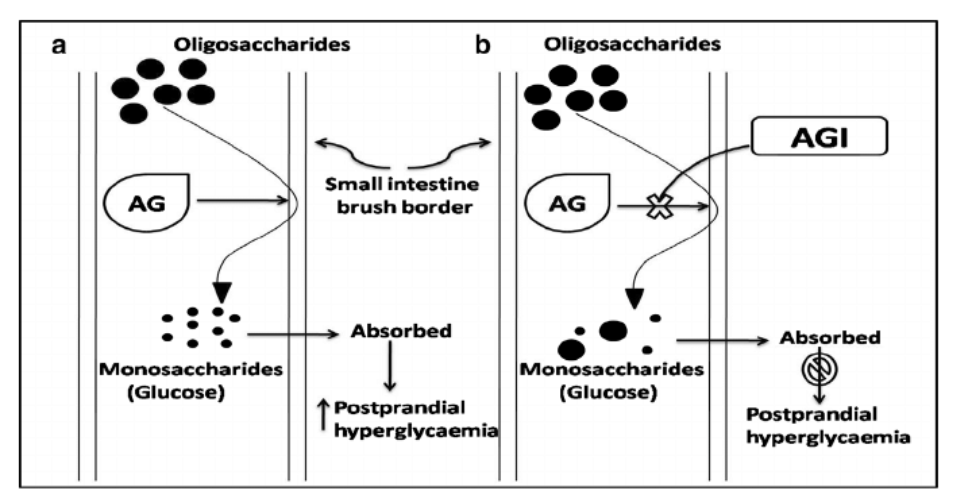
- Acarbose belongs to group of drugs called alpha glucosidase inhibitors which are oral hypoglycemic agents. Acarbose is one of the two approved alpha glucosidase inhibitors. The other one is miglitol.
- Acarbose is pseudo carbohydrate derived from actinomycetes.
Available Brands
- Brand- Precose, Glucobay
- It is also available as generic medicine.
Uses of acarbose
- It is used in adjunct with diet and exercise for treatment of type 2 diabetes. Used in combination with other oral hypoglycemic agents.
- For diabetic coma and diabetic ketoacidosis associated with type 2 diabetes.
- It is also found useful in Type 1 Diabetes and gestational diabetes. However, it is not FDA approved for these uses.
Mechanism of action of acarbose
- Complex carbohydrates, which we obtain from our food are broken down into absorbable simple sugar by intestinal enzymes like pancreatic alpha amylase, alpha glucosidase including sucrase, maltase, isomaltase, glucoamylase etc. These simple sugars are easily absorbed into blood stream. Alpha glucosidase enzymes are in brush border of intestine.
- Acarbose is a complex oligosaccharide which inhibit these enzymes and delays digestion of carbohydrates like starch, dextrin and disaccharides and hence lower post prandial glucose level.
- Acarbose has 104 – 105 times more affinity to bind with and inhibit alpha glucosidase.

Figure – Mechanism of action of alpha-glucosidase inhibitors
Pharmacokinetics of acarbose
- Available as 25 mg, 50 mg or 100 mg oral tablet. It is administered via oral route. Patients should take it three times a day with the first bite of each meal. Treatment starts with lower dose, 25 mg, 3 times a day. Later on dose is adjusted according to patient’s health condition. Maximum recommended dose is 100 mg 3 times per day.
- Acarbose is poorly absorbed from gut and have low oral bioavailability. Only around 1-2% of orally administered drug reaches to systemic circulation. Excretion takes place via fecal route.
- Metabolism takes place in GI tract mainly by intestinal bacteria and by intestinal enzymes. Some metabolites are sulfate, methyl, and glucuronide conjugates of 4- methyl pyrogallol.
Missed Dose
- If a patient misses his/her dose of acarbose, they should skip the missed dose and continue with their regular dosing schedule. Extra dose should not be taken to make up for missed dose.
Overdose
- Overdose of acarbose may cause GI related effects like flatulence, distension, abdominal discomfort etc. In cases of overdose, foods and drinks rich in carbohydrate like rice, potatoes should be avoided for 4-6 hours to prevent deterioration of GI symptoms.
Adverse effects of acarbose
- Some common side effects include flatulence, loose stools, and abdominal discomfort. These are caused due to degradation of undigested carbohydrates by bacteria in colon and eating carbohydrate rich foods may increase severity of GI effects. Flatulence occurs in around 75% of cases.
- It can also cause hepatitis and elevation of hepatic enzymes.
- Unlike other oral hypoglycemic agents, acarbose doesn’t cause hypoglycemia as it doesn’t stimulate insulin release or increase insulin sensitivity. However, when combined with insulin or insulin secretagogue, hypoglycemia may occur. As this drug inhibit sucrase, such hypoglycemic conditions should be treated with glucose and not with sucrose.
Drug Interactions
- When used in combination with other oral hypoglycemic agents like sulfonylurea or insulin, it may cause hypoglycemia. Symptoms of hypoglycemia include sweating, shaking, dizziness, increased heart rate etc.
- Concurrent administration with other drugs like oral contraceptives, levothyroxine may also affect blood sugar level. Concurrent administration with following drugs may increase blood sugar level and lead to hyperglycemia:
- Niacin
- Antipsychotic drugs like chlorpromazine
- Beta blockers
- Corticosteroids (hydrocortisone, prednisolone, methylprednisolone)
- Diuretic (Hydrochlorothiazide, furosemide, torsemide)
- Digoxin
- Isoniazid (used for treatment of tuberculosis).
- Taking acarbose with alcohol may also affect blood sugar level. Its effectiveness may be decreased when used with digestive enzymes like amylase, protease and lipase.
Contraindications/ Warnings
Acarbose should not be used in following conditions:
- In patients with chronic intestinal disease including intestinal obstruction, colonic ulceration and IBD (inflammatory bowel disease).
- Contraindicated in patients allergic to acarbose.
- In diabetic ketoacidosis.
- Their safety in pediatric and pregnant women has not been established. It is pregnancy category B drug. One should let their doctor know if they are pregnant or are planning to be pregnant.
- It should be avoided by breastfeeding females.
- Not used in patients with age less than 18 years.
Storage conditions
- Acarbose should be stored in dry place, at room temperature. It shouldn’t be stored in very high or very low temperature.
- The container should be tightly closed and shouldn’t be stored in wet and moist places.
References
- https://go.drugbank.com/drugs/DB00284
- https://www.everydayhealth.com/drugs/acarbose#drug-uses
- https://www.ncbi.nlm.nih.gov/books/NBK493214/
- https://www.frontiersin.org/articles/10.3389/fendo.2020.00288/full
- https://www.wjgnet.com/1948-9358/full/v13/i1/1.htm
- Zhang XL etal. The effects of acarbose therapy on reductions of myocardial infarction and all-cause death in T2DM during 10-year multifactorial interventions (The Beijing Community Diabetes Study 24). Scientific Reports. 11 (4839).
- Laube H. Acarbose: An Update of its Therapeutic use In Diabetes treatment. Clinical Drug Investigation. 22; 141-156.